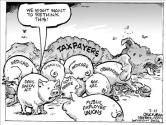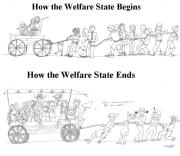When I give speeches around the country, I often get asked whether it’s time to give up.
 More specifically, has America reached a tipping point, with too many people riding in the wagon of government dependency and too few people creating wealth and pulling the wagon in the right direction?
More specifically, has America reached a tipping point, with too many people riding in the wagon of government dependency and too few people creating wealth and pulling the wagon in the right direction?
These questions don’t surprise me, particularly since my speeches frequently include very grimBIS, OECD, and IMF data showing that the long-run fiscal problem  in the United States is larger than it is in some nations that already are facing fiscal crisis.
in the United States is larger than it is in some nations that already are facing fiscal crisis.
But that doesn’t mean I have a good answer. I think there is a tipping point, to be sure, but I’m not sure whether there’s a single variable that tells us when we’ve reached the point of no return.
Is it when government spending consumes 50 percent of economic output? That would be a very bad development if the burden of government spending reached that level, but it’s not necessarily fatal. Back in the early 1990s, the public sector was that big in Canada, yet policy makers in that country were able to restrain budgetary growth and put the country on a positive path. Sweden is another nation that has turned the corner. Government spending peaked at 67 percent of GDP in the early 1990s, but is now down to 47 percent of GDP after years of free-market reforms.
 Is it when a majority of households are getting government handouts? That’s also a worrisome development, especially if those folks see the state as a means of living off their fellow citizens. But taking a check from Uncle Sam doesn’t automatically mean a statist mindset. As one of my favorite people opined, “some government beneficiaries – such as Social Security recipients – spent their lives in the private sector and are taking benefits simply because they had no choice but to participate in the system.”
Is it when a majority of households are getting government handouts? That’s also a worrisome development, especially if those folks see the state as a means of living off their fellow citizens. But taking a check from Uncle Sam doesn’t automatically mean a statist mindset. As one of my favorite people opined, “some government beneficiaries – such as Social Security recipients – spent their lives in the private sector and are taking benefits simply because they had no choice but to participate in the system.”
Recommended
Is it when a majority of people no longer pay income taxes, leaving a shrinking minority to bear all the burden of financing government? It’s not healthy for society when most people think government is “free,” particularly if they perceive an incentive to impose even higher burdens on those who do pay. And there’s no question that the overwhelming majority of the tax burden is borne by the top 10 percent. There’s little evidence, though, that the rest of the population thinks there’s no cost to government – perhaps because many of them pay heavy payroll taxes.
I explore these issues in this interview with Charles Payne.
The main takeaway from the interview is that the tipping point is not a number, but a state of mind. It’s the health of the nation’s “social capital.”
So for what it’s worth, the country will be in deep trouble if and when the spirit of self-reliance becomes a minority viewpoint. And the bad news is that we’re heading in that direction.
 The good news is that we’re not close to the point of no return. There is some polling data, for instance, showing that Americans still have a much stronger belief in liberty than their European counterparts.
The good news is that we’re not close to the point of no return. There is some polling data, for instance, showing that Americans still have a much stronger belief in liberty than their European counterparts.
And we’ve even made a small bit of progress against big government in the past few years.
I speculated in the interview that we probably have a couple of decades to save the country, but it will become increasingly difficult to make the necessary changes – such as entitlement reform andwelfare decentralization – as we get closer to 2020 and 2030.
 And if those changes don’t occur…?
And if those changes don’t occur…?
That’s a very grim subject. I fully understand why some Americans are thinking about the steps they should take to protect their families if reforms don’t occur and a crisis occurs.
Indeed, this to me is one of the most compelling arguments against gun control. If America begins to suffer the chaos and disarray that we’ve seen in nations such as Greece, it’s better to well-armed.
Though maybe there will be some nations that remain stable as the world’s welfare states collapse. And if emigration is your preferred option, I’d bet on Australia.
But wouldn’t it be better to fix what’s wrong and stay in America?

























Join the conversation as a VIP Member